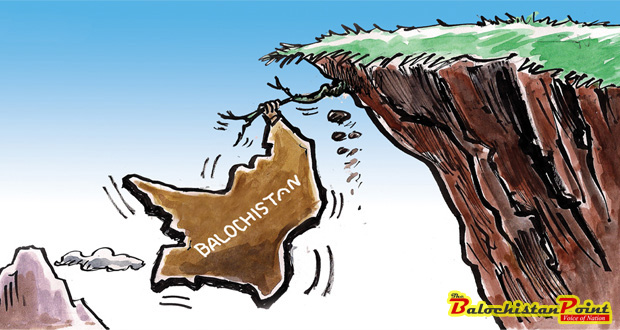Ayaz Ahmed
This is Part-2 of three articles series on this topic.
Click here to read Part-1 of this series
Most schools are in dilapidated condition and bereft of required facilities i.e., scientific equipments, adequate class rooms, clean drinking water, play grounds and toilets. Moreover, a large number of teachers lack requisite qualifications and relevant training. To exacerbate this, many teachers get recruited either by favoritism or they pay large sum of money. further, unchecked widespread corruption, absenteeism, lack of job satisfaction, closure of schools by recurrent strikes, existence of thousands of ghost teachers, hold and sway of landlords over schools and poor socio economic conditions of parents are some of the major mounting problems confronting the education of the province. Resultantly, uneducated or half educated youth fail to grasp their fundamental constitutional rights, and presumably vote for corrupt, incompetent and influential politicians who in return flagrantly plunder rich provincial resources, thus obstructing the predetermined socio- economic progress.
Secondly, Balochistan’s political system has miserably failed to provide the dispiriting people with requisite good governance on account of a host of deeply rooted factors. To begin with, its all democratic set ups including the recently elected local bodies were systematically selected in a non transparent manner. Also, corrupt, incompetent, maverick and traditional politicians and powerful landlords heavily bank on unmatchable influence and considerable black or looted money to skilfully purchase votes, thereby successfully coming into the saddle thus ably obstructing the politically literate youth to penetrate into the unworkable politics of the province. To worsen this grim situation, the federal government and the military leadership still call the main shot on legislative, political, economic and security fronts. In a nutshell, the provincial politics is beset with multifaceted and widespread corruption, unbridled misappropriation and plundering of provincial money and depleting resources, nepotism and favoritism of key bureaucratic posts, politicization of lax and servitude bureaucracy, bureaucratic red tape and existing obstructive and troublesome feudalism. Consequently, the provincial political system has dismally unraveled, so bringing about bad governance and staggering backwardness of the people, and resultantly, stimulating low intensity insurgency in the province.
Thirdly, the province is also faced with swelling and entrenched economic issues. Despite possessing potential natural resources worth trillion dollars Balochistan is still the most backward area. According to the Dawn, the unemployment ratio is appallingly high: almost 33 per cent people in Balochistan are out of any kind of job. According to a report titled ‘Clustered Deprivation’, published by the Sustainable Development Policy Institute in 2014, 52 percent people of Balochistan are living below the poverty line. That means that more than half of Balochistan cannot earn even $1.25 per day. According to the National Nutrition Survey of 2011, sixty-three percent people of Balochistan are suffering from food security. A meager amount is spent on needed development projects as reflective from the provincial budget of Rs. 215 billion for the fiscal year 2014-15. Amazingly, 77 percent of this budget is spent on non-development expenditures. Over 50 percent of province’s population has no or little access to good education, healthcare and has woefully poor living conditions with no proper arrangements for sanitation and no supply of potable water or electricity.
It lacks appropriate road and rail infrastructure for trade and investment. Most industries are owned by either the politicians or big landlords in which forced and bonded labourers work in shabby and inhumane conditions with meager wages and salaries. Further, its strategically important littoral areas are a major and busy hub of international drug trafficking and smuggling of Iranian oil. As per UNODC’s World Drug Report 2012, almost one-third of the drugs worth an estimated $30 billion produced in Afghanistan are smuggled to the rest of the world mostly via the coastal areas of Balochistan, and 0.28 million young Baloch are drug addicts. Such illicit business helps the influential black marketers amass substantial wealth hence troubling the faltering provincial economy and injecting drug into the youth. Alarmingly, terrorists, insurgents are also engaged in garnering money to relentlessly continue their troublesome missions.
Lastly, the province is also plagued by deteriorating law and order situation partly emanating from disruptive insurgency and partly from undertrained, poorly equipped, highly politicized and toothless police force. According to the South Asia Terrorism Portal (SATP)’s partial database, the province has recorded at least 3,295 civilian fatalities since 2004. It is also a flashpoint and hotbed of Shia-Sunni schism and muscle-flexing that continually results in deadly suicide attacks and mass butchering of endangered Hazaras and forced migration. Zohra Yusuf, chairperson of the Human Rights Commission of Pakistan (HRCP) claimed on October 12, 2014 that Balochistan had been made a fertile place for armed religious extremists under a plan and, as a result, about 300,000 Shias, Zikris, and Hindus had been forced to migrate to other areas of the country. Moreover, outlawed Baloch liberation outfits also carry out bombings and killing of Punjabi workers. In retaliation, the military security agencies conduct operations time and again which entail showdowns with insurgents, abduction, arrest and extra judicial killings of large number of suspected persons. As per SATP’s estimates, at least 153 bullet-riddled bodies were recovered in Balochistan throughout 2014, as against 39 such recoveries in 2013 .Furthermore, The Voice for Baloch Missing Persons (VFBMP), an advocacy group, insists that more than 19,000 Baloch political activists and sympathizers have been subjected to enforced disappearances over the last 13 years. The heavy presence of security personnel has made the province a garrison area. Resultantly, gross and ubiquitous human rights violation occur which fuel militancy and insurgency.
(To be continued)
Author is a former assistant researcher at the Pakistan Institute of International Affairs (PIIA). He can be reached at AyazAhmed6666@gmail.com
Published in The Balochistan Point on August 13, 2015
Disclaimer: Views expressed in this article are those of the author and The Balochistan Point not necessarily agrees with them.
 Balochistan Point Voice of Nation
Balochistan Point Voice of Nation




